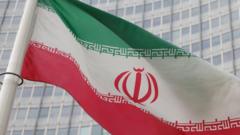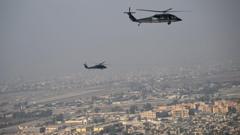The U.S. is reducing its diplomatic presence in Iraq and calling for military family evacuations amidst rising tensions in the region.
U.S. Diplomats Pullout from Iraq as Middle East Tensions Escalate

U.S. Diplomats Pullout from Iraq as Middle East Tensions Escalate
State Department's decision amid nuclear talks deadlock with Iran raises alarms.
In response to increasing tensions between the United States and Iran, the U.S. State Department has announced the withdrawal of diplomatic staff from Iraq, causing ripples across the already volatile Middle East. The Pentagon has also sanctioned the voluntary exit of military family members stationed in the region, indicating a significant scaling down of U.S. commitments.
This decision follows an alarming realization that nuclear negotiations between the U.S. and Iran appear to have stalled. In an interview on Wednesday, President Trump expressed growing skepticism about achieving a comprehensive nuclear agreement with Iran, citing the nation's "unacceptable" negotiating stance.
In the backdrop, Israeli officials issued a stark warning, hinting at potential military action against Iran if it does not relent concerning its nuclear ambitions. These tensions coincide with a statement from the United Kingdom, which issued a advisory note cautioning commercial shipping in critical waterways like the Persian Gulf. They highlighted the potential for heightened military activity that could impact vessels navigating those waters.
The advisory underscores the urgency of the situation, urging mariners to exercise increased caution while transiting strategic routes. As U.S. military leadership monitors the region, the well-being of its personnel and families remains a top priority amidst the imminent threats, prompting the Pentagon's protective measures.
Moreover, hopes for resolution through diplomatic channels remain tenuous, with another round of talks between U.S. and Iranian negotiators scheduled for later this week. However, trust is waning, and with each passing day, the risk of conflict looms larger over the region.
This decision follows an alarming realization that nuclear negotiations between the U.S. and Iran appear to have stalled. In an interview on Wednesday, President Trump expressed growing skepticism about achieving a comprehensive nuclear agreement with Iran, citing the nation's "unacceptable" negotiating stance.
In the backdrop, Israeli officials issued a stark warning, hinting at potential military action against Iran if it does not relent concerning its nuclear ambitions. These tensions coincide with a statement from the United Kingdom, which issued a advisory note cautioning commercial shipping in critical waterways like the Persian Gulf. They highlighted the potential for heightened military activity that could impact vessels navigating those waters.
The advisory underscores the urgency of the situation, urging mariners to exercise increased caution while transiting strategic routes. As U.S. military leadership monitors the region, the well-being of its personnel and families remains a top priority amidst the imminent threats, prompting the Pentagon's protective measures.
Moreover, hopes for resolution through diplomatic channels remain tenuous, with another round of talks between U.S. and Iranian negotiators scheduled for later this week. However, trust is waning, and with each passing day, the risk of conflict looms larger over the region.





















